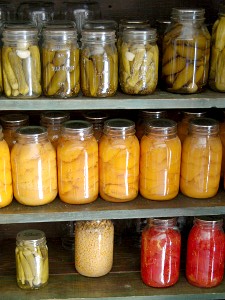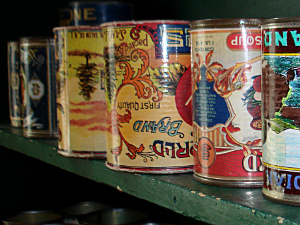The financial pros and cons for building up a food store/pantry
Writing about my “I’ll keep a store cupboard in case zombies attack!” paranoia yesterday (ahem) reminded me that I wrote something for a personal finance website last year but for some reason, didn’t get around to sending it over. I’ve re-edited it to make it suitable for here/now but have kept it purely about the financial side of things. I would love to hear your thoughts on it.
Over the last few years, we seem to be experiencing more and more cases of extreme weather and natural disasters. This year in the UK, we’ve had an unusually wet summer, leading to flooding, and elsewhere around the northern hemisphere, it’s been too hot, which has caused fires. There have also been unseasonal hurricanes/tornados, and while we’ve been comparatively lucky so far this year, 2011 was horrendous for other natural disasters such as the earthquakes in New Zealand and the earthquake/tsunami in Japan.
There’s no question that having a small supply for food and water is essential if bad weather is predicted and it’s important to maintain emergency supplies in case an unforeseen disaster strikes. But I’ve recently been considering the financial pros and cons of keeping a larger store pantry.
Why it makes financial sense to keep a large food store at home
 Aside from the security of having emergency supplies when needed, the largest day-to-day benefits of maintaining a large store at home are the financial ones. Many people with large food stores grow and/or preserve a lot of their own food when it’s in season so have put-up supplies that are a lot cheaper than it would cost to buy them ready-made in the shops/out of season.
Aside from the security of having emergency supplies when needed, the largest day-to-day benefits of maintaining a large store at home are the financial ones. Many people with large food stores grow and/or preserve a lot of their own food when it’s in season so have put-up supplies that are a lot cheaper than it would cost to buy them ready-made in the shops/out of season.
Certain items (such as sacks of wheat berries, dried pulses or rice) can be bulk bought, resulting in a cheaper cost-per-serving, and in many places can also be bought direct from the producer or through a not-for-profit co-op, cutting the price even further.
Having a well-stocked store and list of “store-cupboard recipes” should also reduce the amount of times/frequency with which you visit your local supermarket. When you shop your own pantry, you’re not going to get persuaded to part with a few pounds on unnecessary temptations and treats. Depending on how far you are from your local shops, that may also save a considerable amount of money in fuel/public transport costs too, as well as time.
As well as saving money directly and indirectly in the first place, a large pantry is also essentially a saving scheme. In the UK interest rates on savings accounts are considerably lower than the rate of inflation so our bank savings are actually shrinking in real terms while food prices are rising. Items bulk-bought a year ago will have been cheaper in both ways: the sticker price will have been less and our actual money will have gone further too.
When keeping a large food store at home can cost you money
 However, while our bank savings may be slowly shrinking, at least they’re not risk of going stale, mouldy or being eaten by rodents (or at least I hope not). Of course, those risks can be minimised with good stock rotation and appropriate storage containers – but purpose-bought storage containers can be expensive. Admittedly they’re reusable and you should get years of use from them but there is still an initial start-up cost. In fact, every aspect of creating a store cupboard involves upfront spending that some people may not be able to afford while living hand-to-mouth. It also requires ongoing maintenance and attention, time which might be better spent saving money elsewhere or increasing the household income someway.
However, while our bank savings may be slowly shrinking, at least they’re not risk of going stale, mouldy or being eaten by rodents (or at least I hope not). Of course, those risks can be minimised with good stock rotation and appropriate storage containers – but purpose-bought storage containers can be expensive. Admittedly they’re reusable and you should get years of use from them but there is still an initial start-up cost. In fact, every aspect of creating a store cupboard involves upfront spending that some people may not be able to afford while living hand-to-mouth. It also requires ongoing maintenance and attention, time which might be better spent saving money elsewhere or increasing the household income someway.
In places with very hot summers and cold or damp winters, extra care has to be taken about where the store is located to avoid spoilage – in practical terms, that generally means in air-conditioned/heated parts of the house rather than in an outhouse or garage. There are plenty of clever tips to “hide” bulk-bought items around the home but your heating/cooling bills may increase if you have to control temperature for the sake of the food when you’d ordinarily be out of the house (eg, during the day or on holiday). Food stored in freezers is obviously less affected by seasonal fluctuations but has a year-long power cost that should be considered: new, efficient freezers in suitable locations in the home are pretty cheap really but older, less efficient freezers cost far more to run. We usually keep our freezer well-stocked, with batch home-cooked “ready meals” and direct-from-the-local-farmer organic meat, which we buy in bulk but is still pretty expensive. If the freezer broke or we lost power for an extended period of time, we’d lose (or have to use ASAP) meat which represents a considerable amount of money. (Our household insurance would cover it, but with our excess, it wouldn’t be worth claiming.)
Aside from spoilage worries, tastes also change (especially in children) and dietary issues/allergies can develop, which could result in a lot of food you can no longer eat. If the food is still good, just no longer wanted, you could sell or barter the excess for something you can still eat – but there is still a chance that you’ll be left with money locked up in food that’ll ultimately go in the bin.
Are there any financial pros/cons on building up a food store/pantry that I’ve missed? Do you have any tips for setting up/maintaining a larder from a financial point of view?
(Can photo by CWMGary)
Read MoreIs it weird to keep a well-stocked larder?
 Karen (hi Karen!) commented on my last post (Winter IS coming) saying her main winter prep concern now is stocking up their larder. She lives somewhere rural and they regularly get snowed in so having a well-stocked food store is critical.
Karen (hi Karen!) commented on my last post (Winter IS coming) saying her main winter prep concern now is stocking up their larder. She lives somewhere rural and they regularly get snowed in so having a well-stocked food store is critical.
I often feel a little silly keeping a packed larder here though. While estate agents might claim the woodland and numerous fields of cows close by make our area “semi-rural”, it really isn’t. There are two decent-size supermarkets within less than five minutes walking distance and while our road is rarely cleared of snow, the nearby main road is kept gritted so we can still get about (even on public transport) quite easily. And yet… Last time I was unpacking a big shop, I remarked to John how it soothes me to know the cupboard is full of beans, and tomatoes, and pasta, and whatnot. It’s not like I’m anxious all the time when it’s empty, I just feel better knowing that stuff is there.
Around this time last year I wrote a list of our store cupboard “essentials” and I think that list is still the same now, with the addition of extra tinned fish and pickled/in oil roasted peppers. Like many things on the list, those items aren’t “so we don’t die” essential but would allow us to maintain a relatively varied diet in a strange situation (which would help keep our immune systems perky) or means that we will use up the stores in our normal rotation. I don’t know how we’d be manage if the fit really hit the shan but I think we have more than enough to last through a normal-abnormal situation, if you know what I mean, be it related to the weather, illness or a financial hiccup.
But, for me here with my supermarkets and main road & mains gas, it still does feel silly to keep a pantry full of (almost entirely) shop-bought items. It feels like I’ve been reading too many of my post-apocalyptic books again, or I’m paranoid, or I’m expressing some mental unrest issue through hoarding behaviour. It felt silly admitting to John that I had, no matter how small amount, felt anxious about the more-empty-than-usual cupboard and it feels even sillier admitting it here, even though I know from the post last year that many of you keep stores too. The photo is not our larder, I wish it was – I can understand “putting up” your own, that makes sense – but buying stuff from a supermarket to store it “just in case”…? I know about crop failures and “just in time” logistics so the rational part of me knows how fragile our food chain is but still, it feels robust enough to make me feel silly for keeping a store at home.
But for all of human history up to, what? 20? 30? years ago, keeping a well-stocked pantry was the norm so it also seems silly to think it seems silly. ;) It’s very odd.
Does anyone else know what I mean or is this me being strange again? Have you had funny reactions when people find out you keep stores or do you feel a bit weird about admitting it? Should I start a “pantry-keepers anonymous” group? ;) Or, on the other hand, do you think it is actually silly to keep a stock of food at home when you live in an urban/supermarket-adjacent area? I’d love to hear your thoughts.
Read More


